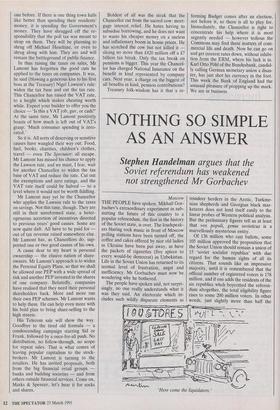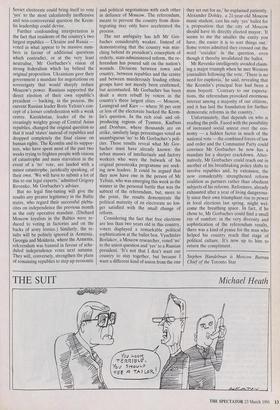NOTHING SO SIMPLE AS AN ANSWER
Stephen Handelman argues that the
Soviet referendum has weakened not strengthened Mr Gorbachev
Moscow THE PEOPLE have spoken. Mikhail Gor- bachev's extraordinary experiment in sub- mitting the future of this country to a popular referendum, the first in the history of the Soviet state, is over. The loudspeak- ers blaring rock music in front of Moscow polling stations have been turned off, the coffee and cakes offered by nice old ladies in Ukraine have been put away, as have the packets of cigarettes (five apiece to every would-be democrat) in Uzbekistan. Life in the Soviet Union has returned to its normal level of frustration, angst and inefficiency. Mr Gorbachev must now be wondering why he bothered.
The people have spoken and, not surpri- singly, no one really understands what it was they said. An electorate which in- cludes such wildly disparate elements as reindeer herders in the Arctic, Turkme- nian shepherds and Georgian black mar- keteers does not lend itself easily to the linear probes of Western political analysis. But the preliminary figures tell us at least that vox populi, genus sovieticus is a marvelously mysterious entity.
Of 136 million who cast ballots, some 105 million approved the proposition that the Soviet Union should remain a union of 15 'soviet socialist republics' with due regard for the human rights of all its citizens. That sounds like an impressive majority, until it is remembered that the official number of registered voters is 178 million, and if one adds the residents of the six republics whch boycotted the referen- dum altogether, the total eligibility figure rises to some 200 million voters. In other words, just slightly more than half the 'Here come the liquidators.' Soviet electorate could bring itself to vote 'yes' to the most calculatedly inoffensive and non-controversial question the Krem- lin leadership could devise.
Further confounding interpretation is the fact that residents of the country's two largest republics — Ukraine and Russia — voted in what appear to be massive num- bers in favour of additional questions which contradict, or at the very least neutralise, Mr Gorbachev's vision of strong federalism which lay behind the original proposition. Ukrainians gave their government a mandate for negotiations on sovereignty that would sharply reduce Moscow's power. Russians supported the direct election of their own republic's president — backing, in the process, the current Russian leader Boris Yeltsin's con- cept of a looser confederation with a weak centre. Kazakhstan, leader of the in- creasingly weighty group of Central Asian republics, changed the original question so that it read 'states' instead of republics and dropped completely the final clause on human rights. The Kremlin and its suppor- ters, who have spent most of the past two weeks trying to frighten people with visions of catastrophe and mass starvation in the event of a `no' vote, are landed with a minor catastrophe, juridically speaking, of their own. 'We will have to submit a lot of this to our legal experts,' admitted Grigory Revenko, Mr Gorbachev's adviser.
But no legal fine-tuning will give the results any greater legitimacy in the Baltic states, who regard their successful plebis- cites on independence the previous month as the only operative mandate. (Diehard Moscow loyalists in the Baltics were re- duced to voting in factories and on the backs of army lorries.) Similarly, the re- sults will be politely ignored in Armenia, Georgia and Moldavia, where the Armenia, referendum was banned in favour of sche- duled independence votes next autumn. They will, conversely, strengthen the plans of remaining republics to step up economic and political negotiations with each other in defiance of Moscow. The referendum, meant to prevent the country from disin- tegrating may only have accelerated the process.
The net ambiguity has left Mr Gor- bachev considerably weaker. Instead of demonstrating that the country was mar- ching behind its president's conception of orderly, state-administered reform, the re- ferendum has poured salt on the nation's wounds. Divisions between town and country, between republics and the centre and between murderously feuding ethnic groups have not merely been confirmed, but accentuated. Mr Gorbachev has been dealt a stern rebuff by voters in the country's three largest cities — Moscow, Leningrad and Kiev — where 50 per cent or less of the electorate backed the Krem- lin's question. In the rich coal- and oil- producing regions of Tyumen, Kuzbass and Donbass, where thousands are on strike, similarly large percentages voted an unambiguous `no' to Mr Gorbachev's poli- cies. These results reveal what Mr Gor- bachev must have already known: the urban masses of intellectuals and factory workers who were the bulwark of his original perestroika programme are seek- ing new leaders. It could be argued that they now have one in the person of Mr Yeltsin, who was emerging this week as the winner in the personal battle that was the subtext of the referendum, but, more to the point, the results demonstrate the political maturity of an electorate no lon- ger satisfied with the small change of reform.
Considering the fact that free elections are less than two years old in this country, voters displayed a remarkable political sophistication at the ballot box. Vyachislav Borlakov, a Moscow researcher, voted 'no' to the union question and 'yes' to a Russian president. 'It's not that I don't want our country to stay together, but because I want a different kind of union from the one they set out for us,' he explained patiently. Alexander Dolsky, a 21-year-old Moscow music student, cast his only 'yes' ballot for a proposition that the city of Moscow should have its directly elected mayor: 'It seems to me the smaller the entity you have, the easier it is to sort things out.' Some voters admitted they crossed out the word 'socialist' in the question, even though it thereby invalidated the ballot.
Mr Revenko intelligently avoided claim- ing a major triumph when he met Western journalists following the vote. 'There is no need for euphoria,' he said, revealing that the Kremlin's principal fear had been a mass boycott. 'Contrary to our expecta- tions, the referendum provoked enormous interest among a majority of our citizens, and it has laid the foundation for further democratic reforms in the country.'
Unfortunately, that depends on who is reading the polls. Faced with the possibility of increased social unrest over the eco- nomy — a hidden factor in much of the national vote — the combined forces of law and order and the Communist Party could convince Mr Gorbachev he now has a mandate for a sharper crackdown. Alter- natively, Mr Gorbachev could reach out in another of his breathtaking policy shifts to involve republics and, by extension, the now considerably strengthened reform coalition as partners rather than obedient subjects of his reforms. Reformers, already exhausted after a year of living dangerous- ly since their own triumphant rise to power in local elections last spring, might wel- come the breathing space. In fact, if he chose to, Mr Gorbachev could find a small ray of comfort: in the very diversity and sophistication of the referendum results, there was a kind of praise for the man who helped his country reach that stage of political culture. It's now up to him to return the compliment.
Stephen Handelman is Moscow Bureau Chief of the Toronto Star



























































 Previous page
Previous page